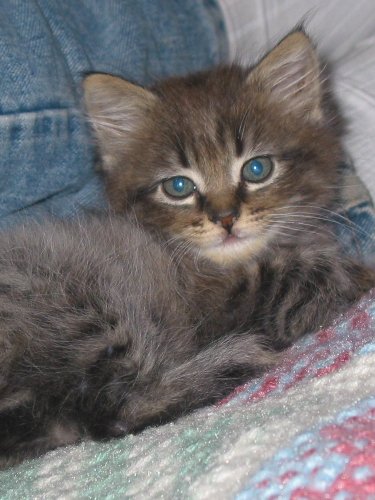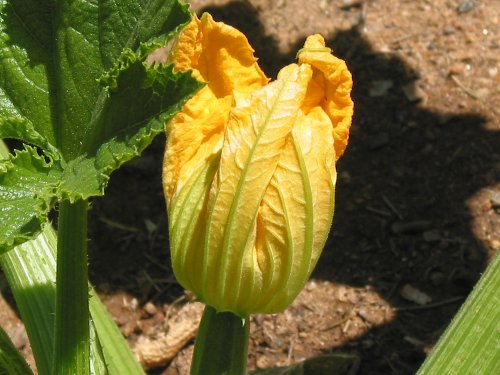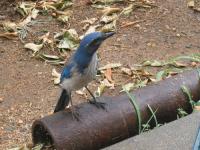February 6, 2009
It doesn’t seem possible that we can already be one month and six days into 2009. I’ve been posting so infrequently that the blog barely has a pulse. But it is alive I assure you. It’s just been sleeping, dreaming if you will.
It’s raining and stormy today and I’m grateful for that. I think this is only our fourth big rain of the season so far. My cat Tara had a bath a few days ago on a warm, sunny, dry day that got to 80 degrees and seems to have become typical weather this winter. At least it’s been easy on the heating bill. Not so easy on the water bill or my sinuses.
I’ve been away from blogs except to post my ramblings about Tarot at Spirit Blooms. I’ve worked off-line at my other computer on artwork, read or posted on a couple of favorite Internet forums (more than I should), and searched out alternatives on- and off-line to spending money that I don’t have on books that I dearly want. I started out reading about Carl Gustav Jung; now I’m reading the writings of Jung himself, beginning with his autobiography written late in life, Memories, Dreams, Reflections . Still deep in my J. R. R. Tolkien adventure, I recently finished reading The Annotated Hobbit, and now I’m savoring The Lord of the Rings. I’m a little shocked by how much watching the movies in the interim has botched my memory of the original story. Still they’re excellent movies. One should appreciate each on its own merits, the novel and the movies as separate creative entities. To do the written story complete justice there would’ve had to be nine or more movies instead of three. Not that I would complain, but not everyone is the Tolkien fiend that I am. Up ahead I plan to continue with The Silmarillion
. Still deep in my J. R. R. Tolkien adventure, I recently finished reading The Annotated Hobbit, and now I’m savoring The Lord of the Rings. I’m a little shocked by how much watching the movies in the interim has botched my memory of the original story. Still they’re excellent movies. One should appreciate each on its own merits, the novel and the movies as separate creative entities. To do the written story complete justice there would’ve had to be nine or more movies instead of three. Not that I would complain, but not everyone is the Tolkien fiend that I am. Up ahead I plan to continue with The Silmarillion and The Children of Hurin. Perhaps others, who knows? I’m taking my time, reading mostly late in the evening before sleep, if I’m not too tired by then.
and The Children of Hurin. Perhaps others, who knows? I’m taking my time, reading mostly late in the evening before sleep, if I’m not too tired by then.
Eric Mayer mentioned, in his comment on my earlier post about rereading favorites, that he almost never rereads books. I’ve been the same way most of my adult life. I reread a lot when I was a teen and young adult, but at some point I realized there was plenty in print to read the first time around, and life was short. I felt that I’d miss out on too many other things if I spent my time rereading favorites.
I’ve changed my attitude about that again only recently. This has to do partly with some of the newer fiction that I’ve been dissatisfied with, partly with my budget, and partly with the tiny library here in town where the tastes of the librarians don’t seem to mesh with my own — or I’m just quirky in my reading tastes. I’m sure they have some Tolkien and maybe some Jung, but I’ve come to prefer to take my time and not feel constrained by a return date anyway. I tried writing reviews here for a while, and I found that if the book was a library book I had to return it too quickly, and if I tried to write a review after that, I kept wanting to refer to the book. If I like it, I want it to stay around for a while. I also tried our library’s on-line interconnection with an ebook download system, but that didn’t work for me. Old computer or aging human brain inside user? Either way it didn’t work and I didn’t want to waste time fussing with it. I wanted to read the book. You know, just open a cover and start reading. If something is going to slow me down I want it to be the savor of words.
That brings me to the fourth reason I’ve gotten back into rereading. Mostly it has to do with wanting to read slowly. I’ve given up on reading everything out there. I’ve finally accepted that’s impossible. I’ve decided to hone down my reading list and read what I love — slowly, and as many times as I want.
When I reread an old favorite I don’t have to be in such a hurry to get to the end. I already know how it ends. There is something to the first bloom of a new story, that first time through when it’s a path of discovery, recognition, and suspense. But this time I can pause and enjoy the language along the way, let the suspense build again slowly. My old favorites have language worth pausing for. The more commercial books today tend to be heavy on suspense and bizarre plots and twists, while they seem too often short on the kind of writing I savor. Many feel to me as if they’re written in too much of a hurry, or as if the writer didn’t even like the story he was writing. The secret to great writing, I think, is for the writer to so love the story that he’s reluctant to leave it. Chances are the reader won’t want to leave it either.
But then I’m not a hurrier, never have been. I think it’s too easy to get into an “I’ll miss something if I slow down” mindset in our day and age, though it’s a valid concern to some degree. In the work world, one must hurry enough to show up when needed, and if one slows down one is in danger of not getting important work done, of missing opportunities, or of not being able to do one’s job anymore because one hasn’t kept up with hyperactive technology. There are sometimes valid reasons to hurry. I don’t want the emergency room team to dawdle, or firefighters to take their time arriving at a fire. For readers who want to keep up, there’s such a huge amount being published, in spite of aspiring writers’ concerns that no one is publishing what they write, that it’s easy to think one has no time to reread or to read slowly the first time. There are also such a great number of people who want to be writers that it doesn’t appear we’ll ever have a shortage of reading material, even very good reading material leaving out the bad. It’s a crowded world full of people with something to say, many of them excellent writers.
Still I think we miss out on too much by trying to do or read everything. I’m not well-read, mainly because I’m a slow reader. Maybe that’s why I appreciate books that take a long time to produce. I can sense the love and time that was put into them. I can linger, relish, and wonder why. I can spend a relatively equal time enjoying them, and feel gratitude that the authors took the time to do it right.
Tolkien took something like 13 years to write The Lord of the Rings between 1937 and 1949. He took longer, when one considers all the thought prior to beginning it that he put into creating the world of Middle-Earth, from the time he was a boy, and the time between 1949 and 1954 that he worked with his publisher to get everything just right. That time shows. And it’s not as if by taking that long he missed out on sales, which seem these days so unforgiving of anyone lagging behind. The only time any of his books went out of print was during Word War II and the after-war years, when paper was rationed in England. Oh, and there was the problem of some proofs being destroyed in a bombing or a fire (I don’t remember which) that caused further delay in getting one edition of The Hobbit back into print. Of course one important factor in his print longevity was in being Tolkien. There have been many imitators and, as Eric seemed to hint in his comment, most imitations have not held up very well. Time is, I think, one reason.
I’m certain that the biggest problems with many books is that they’re devised and written in too much of a hurry, and because they aren’t true to the writer’s own creative promptings. I can see some publisher urging a writer to create something like Tolkien wrote, but to do it right now. Imitation done in a hurry can rarely hold up to the proper process of creation. Sometimes, but not usually. Imitation as a whole is an iffy and questionable practice. Readers may say they want another story like The Lord of the Rings, but they’re not saying they want an imitation. They want more Tolkien, and that’s simply the best possible compliment to the original creator, not to any would-be imitator. Perhaps we sometimes, as readers, make the mistake of confusing the two ideas ourselves and go looking for another Tolkien when we should be looking for something else that’s new and fresh, and over which someone labored long and lovingly.
It’s been said that most of a writer’s work doesn’t take place at the typewriter or keyboard, or even necessarily with paper in hand. It happens inside the mind of the writer. I personally think every writer’s workspace needs a comfy couch, or a bed, and a window with a view of a natural setting or garden, as well as an immense library. I also think it’s safe to say that most great fiction writers have lived what they write. By that I don’t mean they’ve experienced it in physical reality. I mean they have a fertile and active imagination, an ability to visualize the experiences they haven’t actually lived. A relentless imagination at that. We use our imaginations to read, but the writer uses his imagination far more, over and over again, actively reliving the scenes he writes in his mind, working them out until they feel right, until he’s ready to translate them into written language. They get to know their own unconscious realms and facets of their own characters, as well as the archetypes of the collective unconscious, even more than we do ordinarily when we dream at night.
Now I know that some writers create at the keyboard on the fly. I’ve done that too. But the stories I’ve written that I felt best about were usually those that I had in mind for a long time before I dared to put any words down. They were an integrated collection of many things that occurred to me, including some fantasies, day dreams, things I wondered about, and even whole scenes, characters, or settings that occupied my mind well before I realized they’d formed anything close to a story worth sharing or writing down. Some were ideas I couldn’t put away because they begged to be told.
Fast writing may be part of the problem. I once rewrote a novel (Snow Angels) in the course of a few weeks, retyped the whole thing from scratch, from my head. But that story had been in my mind for a long time, in various forms, and even on paper in a few forms, before I did that. I’ve never taken part in NaNoWriMo, but I think it is possible for it to produce something of value, provided there’s something already percolating in the writer’s mind before they begin, perhaps for years before they begin typing it out. I’ve done fast writing exercises, and I know they have their value. But I wonder if the trend in fast writing is the reason so many new books I read leave me flat these days.
There is fast writing that’s great, and there have been many great prolific writers. But if we make the mistake of thinking their greatness lay in their proliferation, we do them a disservice. The secret to great writing also doesn’t lie in taking forever to produce something. I’m sure there are plenty of slowly written pieces of rubbish passing for fiction. But prolific writers are the exceptions to the slow writing rule, I think, and like Mozart’s music, great fast writing is great for other reasons than its speed of production or lack of revision. Of course everyone should write at their own speed, but fast writing of a single draft usually requires slow thinking up front, and long, slow revisions afterward. If one doesn’t take the time to do it right, to follow through, to consider it worth some effort, then even that smaller portion of fast writing time is wasted, not to mention the time anyone else takes to read the result. If it’s not worth spending lots of time writing, then maybe it’s not worth reading either.
In spite of how long Tolkien’s work has remained in print, it’s still possible that work of this kind is best done for oneself, with any idea or intent of publishing as a mere afterthought. One should, after all, consider oneself worth writing well and respectfully for. From what I understand of Tolkien, he only shared what he created with a few colleagues, friends, and his children, until the friend of a friend mentioned the possibility of publishing The Hobbit. Maybe that’s why it’s so good. He took time to shape and polish it to be what he wanted for himself and those he loved. Only after that did he shape and polish it for publication. Surely that provided him a great deal of satisfaction in what he wrote, regardless of whether strangers in his own land or across the pond liked it later on. He was also a real-life expert regarding myths of a world similar to the one he created and regarding the language he used to create it. But was he an expert who happened to come up with a story he was best suited to write, or was he a writer in the making, even as a child, who lived in his head creating a world first and who worked all his life to become expert at just what he needed to recreate that world on paper? Either way, he took his loving time about it, and that’s a good thing for all of us. After all, what’s the rush?
— Barbara @ 1:55 pm PST, 02/06/09
July 14, 2008
I had great plans for today, because I got so much done yesterday morning, outdoors. I finally got more seedlings in the ground — not the easiest task for someone with arthritis and fibromyalgia, who’s out of shape, and who’s working in hard, rocky soil. But I paced myself, got a lot done, and I felt good about it afterward.
I was so happy with the result yesterday that I planned to do more of the same today. Then I wakened later than usual, and not in the best mood. I dealt with kitty behavior issues right away, then I went to the store instead of starting work in the yard. Finally I came home to a hot late morning promising an even hotter day. So I canceled my plans to do more spading and planting, and here I sit indoors with the air conditioner on, wondering why that seems to happen so often. Not the hot weather. That’s to be expected this time of year. But I’ve noticed with many other things I do that when I make specific or detailed plans, they often fall through. Not just gardening tasks.
I realize now that even though I fooled myself for years, dutifully planning my work, both on the job and off, I’m really, at heart, not a planner at all. I’ve told my husband time after time how I like to plan things. But truth to tell, I’ve never actually been much for committing to anything. What I was really saying was probably that I didn’t like anyone else to make plans for me that might keep me from finding my happy accidental tasks. I think it’s because plans seem so often to change — and often for the best — that I’ve discovered this. Plans change. So why bother planning? Of course in the workplace that wouldn’t have flown. In any cooperative effort, plans make sense, because we depend so much on others getting their work done on time.
On my own, who needs plans? Maybe it’s something to do with being a generalist, not a specialist. But in a way I’m like this little cat, self-directed and easily distracted — by the right distractions. Those distractions often become momentary passions, obsessions that frequently happen to turn out really well.
Yes, I could tell myself, “Just get out there and do the damned gardening, like you planned.” But then the joy wouldn’t be in the effort, and instead of feeling good about what I accomplish, I’d be dehydrated, overheated, and feel terrible the rest of the day, possibly tomorrow as well. I know better. So I threw some water on the little transplants, and came inside. Maybe tomorrow morning. . . .
Still I wonder. Why do I get the most done when I don’t plan to? When it’s a spur of the moment, “I think I’ll do this right now” kind of thing? That’s what yesterday’s effort was. I woke up, got dressed, and started right in, because that was exactly what I wanted to do that morning, as soon as I woke up. I woke up inspired. This morning I didn’t. At least not with that inspiration, not with the one I expected.
I notice this is especially true with creative work of all kinds, and with learning, where it’s not the weather that changes things, but something unknown. Just when I wouldn’t think I’d even be in the mood for it, I get a whim and do that different thing, whatever it may be, and that’s when I get the most out of it. I seem to be most productive when I haven’t planned anything at all, when I pay heed to momentary flashes of inspiration or that sudden opportunity. Happy accidents and spontaneous productivity. Do you have them? My life seems full of them. They’re what makes me happy.
Here’s the real mystery: I don’t think it’s just about my mood or how I’m feeling, or the weather. It sometimes seems almost more like a synchronous universal dance of some kind. Sometimes all the pieces are in place, inside me and outside of me.
And it’s not just me. I think there are lots of people, like me, who’ve struggled all our lives to conform to a world that likes plans, schedules, rules. So much so that I grew up, and spent thirty years of adult life, thinking I was more comfortable with plans, schedules, and rules. Actually, as a kid, I never felt right about it. As an adult, I bought into it. Had to, to keep a job. But if that’s the way we should live life, how does one explain all those happy accidents by inventors, scientists, and discoverers through the ages? Granted, a certain amount of preparation took place before those historical happy accidents occurred. But many important discoveries in history weren’t planned. Not the way they turned out. Someone happened by chance to be in the right place at the right time, doing the right thing, or paying attention to what turned out to matter most.
Were they in tune with the synchronous dance of the universe?
For some people, I know this doesn’t work. Planning works for them. That’s great, more power to them. We need planners in the world, and maybe that’s their part of the synchronous dance. Someone has to read the music and keep the time. For me, not planning works. It’s about time I realized it.
Instead of gardening today, what will it be? I won’t know until seconds before I start, or perhaps after I’ve already begun.
— Barbara @ 12:10 pm PST, 07/14/08
July 8, 2008
Our summer weather has set in, likely until mid to late October, so I have to wake up early to get all my outdoor work done. I’m amazed how fast things can grow in the warm weather and get away from me — mostly things I don’t want to grow, like weeds.
My usual care to wear gloves when working in the yard had lapsed recently, but working outside earlier than usual this morning meant that I happened across two black widow spiders. One, on the lower rock wall, was attempting to kill a big iridescent green June Beetle, or what we call a June Beetle here, aka Fig Eater Beetle. The beetle was 10 to 15 times the spider’s size. Their struggle mesmerized me for a moment as I wondered who would win, the beetle snapping spider silk as quickly as it wrapped around it. It was the noise he made that drew my attention in the first place. I would’ve intervened, if I’d had something handy to kill the spider with, but the next time I walked past, the spider — hiding from me, no doubt — was nowhere to be seen and the beetle was bumbling away. I’ll be more careful to wear gloves and not work in flip-flops anymore, unless I’m only watering. Black widows usually hide from people, but I don’t want to surprise one.
My little friend Tara is growing fast. A kitten in the house means lots of interruptions to play, or to stop misbehavior in its tracks, or just to cuddle. I’ll try to post an updated photo later, but it might be a blur unless I catch her when she slows down to nap, bask in a sunny window, or watch TV. She’s now more than three times the size she was when I took these pictures, and darker since her kitten fluff has been replaced by a true dark tabby coat. She’s a Siamese mix, but you wouldn’t know that to look at her.
Tara watched Mikhail Baryshnikov dance, in an older video on the arts channel last night, and I think she decided he’s the most cat-like human she’s seen. I hope she doesn’t expect us to move like that! But maybe it’s good that she knows some humans are capable of it, just to help us keep the upper hand. Sometimes we call her Rocket Cat, and one day recently, as the dog and I watched in glazed over amazement while she raced around and up and down a room, I commented to him, “You know, cats can almost fly.” Indi seemed to agree.
I’m not really sure what all else keeps me busy, but there’s a lot of it, whatever it is. I don’t work in the garden enough to excuse not blogging, but I do spend some time finding things to do with the excess produce.
We’ve had loads of squash from just four plants, so far, some of it now in the freezer and some given away. We may need a bigger freezer if I keep gardening. One way that we like zucchini is simply sautéed in a little olive oil with basil, oregano, salt, and pepper. We’ve had some cucumbers, which I personally think would make a good breakfast food, because just one bite seems to wake me up with its fresh, clean crispness. The tomatoes got a late start (from seed), so we haven’t had any to eat yet, but they’re blooming and setting fruit, growing like mad in the heat. There’s a San Marzano Roma about the size of the end of my thumb that I predict will be the first to the table, unless that little cluster of marble sized cherry tomatoes beats it to perfect redness. With the salmonella scare still pretty much a mystery I’m looking forward, even more than I expected when I planted them, to fresh homegrown tomatoes.
Yesterday we discovered how well extra garden produce can pay off, when we gave a large zucchini to a neighbor boy to take home, and later his mom sent over four of the most perfect little quesadillas I’ve ever tasted. Oh. My. God. These were not the quesadillas you find in Mexican restaurants, or the floppy things we usually concoct with flour tortillas and cheddar cheese, in a skillet. Every part of hers was homemade, including flaky six-inch corn flour shells folded in half and crisped. They were filled with chicken, some kind of white cheese, possibly one of the Mexican cheeses described here, and fresh cabbage, and they came with a magical homemade chili sauce to pour over them. I am positive we got the better end of that exchange. You can’t get food like that in any restaurant, and I’m in heaven just remembering them. It’s odd how a really good hot sauce can actually cool you. As my mouth heated up, my body seemed to cool right off. Must’ve been all my pores and sinuses opening. It was positively delicious. Mmmmh!
— Barbara @ 12:49 pm PST, 07/08/08
May 30, 2008
Mystery author Eric Mayer* mentioned in a recent blog post that his blog journaling hasn’t been very habitual of late. He went on to write about habits, and that got me to thinking about my habits, and how they’ve changed in the past year or so. Obviously, for me, blogging has taken a back seat to other things. So has my fiction writing, other than attempting to sell my latest finished manuscript, a mystery about a tarot reader whose awakening ability as a medium gets her involved in a murder investigation. (Interested agents or publishers are welcome to inquire here.)
Habits can be good or bad, and I’m sure everyone has some bad ones they’d like to unload. But one new habit I’m happy to have taken on this year is gardening.

Gardening is indeed a habit, one that gets into your blood in a way I didn’t anticipate when I started out this year. I’d done a tiny bit of gardening as a kid, when I remember planting one rose bush of my own but mostly helping my grandmother with her strawberries and vegetables on the embankment behind my parents’ house. Later, in my first apartment, I nurtured a few houseplants, and throughout my work life I’ve usually kept a potted plant on my desk. I kept African Violets in a north facing window in the last house we rented, until a cat took over that window sill. Still, my husband did most of the outdoor gardening, with a little weeding here and there on my part, until March of this year.
It started this spring with tending a few vegetable and flower seeds until they sprouted, and then the seedlings until they went into the ground. From there I progressed to caring for plants in the ground and preparing the soil for more of them. It’s rapidly expanding to a succession of all of these things, in the hopes of keeping some fresh produce in our salad and veggie bowls through this summer, as well as brightening a corner of the front yard, where my ultimate goal is to keep flowers blooming in a little cottage style bed year round. I’m a ways from that goal yet.
I’m still new at this, and I got a late start this year, but I get help and advice from various sources, and gardening is now a firm habit that I won’t easily give up. It’s one of the first things I think about in the morning and one of the last I think about before the sun goes down.
The plants seem happy about my gardening habit, when they can figure out what season it is. Our weather this spring switched back and forth for a couple of months from one extreme to the other, first dry Santa Anas with temperatures in the 90s, and then thick cloud cover and a shifting Jet Stream chilled the air to the 50s. This went back and forth for weeks, with little pleasant weather in between, and it kept our plants confused. In the past two weeks the weather has leveled off, and the plants are loving it.
They say beauty is in the eyes of the beholder, and I’ve recently realized there’s little more beautiful to me than a tiny plant bursting out of its seed container. Call me crazy, but I think baby plants can be almost as cute as a kitten, and they, like the kitten, draw out my mothering tendencies.

(I’ll bet you expected a photo of a seedling, but I couldn’t help the obligatory kitten shot.)
To some this pleasure might seem like taking joy in watching paint dry, but to me it’s more like watching a sunset at the end of a heat wave.

We celebrated our first avocado blooms a few months ago.

Now some fruit has set, which we hope will grow to maturity.

Avocados, according to my resident expert Ken who’s read something like 200 online agricultural reports about them, tend to drop a good portion of their fruit early, which can be disappointing to home gardeners. It will be disappointing to me, if it happens, because Reeds are my absolute favorite avocado variety.
Two days ago I celebrated my first squash blossom.

Zucchini may seem an ordinary thing to seasoned gardeners. It’s one of the easiest things to grow and the butt of gardening jokes, usually in reference to an overabundance of it. But I like zucchini, I love my resplendent squash plants with their huge green leaves, and those yellow-orange blossoms are gold to me.

I’m learning more about the various weeds that grow in the garden, some of which are edible. For instance, purslane and dandelion make delicious salad greens. Note, if you decide to try eating weeds from your garden, be careful that you know what you’re eating. Ensure that the plants haven’t been subjected to herbicides or pesticides and that they aren’t in fact toxic weeds.

Even some semi-edible weeds, like the sour grass we all discovered as kids, can be a problem if eaten in quantity, I’m told, and purslane looks very similar to a toxic type of spurge that often grows right alongside it. Have an expert show you how to identify edible weeds, and examine carefully whatever you pick to eat. This point was driven home to me when I found spurge, with its milky sap, growing in my own little purslane patch.
Yesterday Ken pointed me to a Los Angeles Times article about Guerrilla Gardeners, which linked to a slide show on how to make “seed bombs” as well as two blogs, here and here, about guerrilla gardening.
Gardening has not only revolutionized my daily routine. It’s apparently a revolution that’s spreading once again, as Victory Gardens did in the last century, with people today gardening to save money on local food and working on a clandestine volunteer basis to re-green the land.
_ _ _
* In case you aren’t aware, Eric Mayer and Mary Reed’s latest John the Eunuch Byzantine mystery, Seven For A Secret, was released in April by Poisoned Pen Press. If you haven’t kept up with their historical mystery series, it’s not too late to start. The earlier books in the series are still in print, and some are now available as Kindle editions.
— Barbara @ 3:27 pm PST, 05/30/08
March 15, 2008
Have you ever had trouble deciding which topic to read about next, or what to major in in college? Has anyone ever told you that you have too many hobbies? Have you ever thought about leaving a perfectly good job to look for something else that might interest you more — even if it doesn’t pay more? Maybe you’re a generalist.
This past Saturday, Dave Pollard at How To Save the World linked to an essay in his Links of the Week that he described as brilliant and liberating, and I agree.
The essay, by William Tozier of the Notional Slurry blog, is titled, There are exactly two ways: one, and many. The two ways he discusses are specialization and generalization.
William Tozier proposes the notion that we’re all evolved to be generalists, that specialization isn’t normal. I tend to agree when I consider that many of our forbears were more general in their skills and knowledge than we are. Even today, skills tend to be more generalized in humans living closer to nature, and survival in a wilderness requires a lot of flexibility.
When I think about it, the only things our earliest ancestors planned was to survive, and they were never sure how they would have to do that. The only things they finished were a good meal when food was available, or a new tool or garment when an old one wore out — often taking time to add improvements or embellishments, so even they were never finished. They paused to take in their world and observe it. They learned from everything around them. They were creative, they were nomads, and they were students of life. They paid attention to what came their way, they took them as signs of what they needed to do, for now.
William Tozier discusses the problem of explaining to specialists what we generalists do, how to label ourselves in today’s world. It can be a problem, and I think this must be why, long ago, I started to think of myself as a writer. Aside from having an aptitude for English and composition, a writer has to read and learn about many things in order to do what she does. Writing provides an excuse to research anything and everything, as possibly relevant to a project. Later still I began referring to myself as a creative person, because that can involve lots of different interests too, even more than writing. It can encompass activities that are finished when they’re finished, or never finished, rather than finished to deadlines. Of course writers have deadlines, if they hope to make money at it, and there the generalist has to adapt to the specialized modern world.
I conformed to the specialized world for years, in being a reliable employee and meeting deadlines. I glued myself to my chair and focused on my job. I met deadlines, and earned awards and promotions for my conformity and work ethic. But I wasn’t happy. I didn’t even feel healthy doing that. Eventually it became habit, and I got so I felt uneasy if I didn’t have a plan. So then I was really stuck — uneasy with my schedule and commitments, and uneasy when I didn’t have any.
After a lifetime of thinking I wasn’t doing life right, that I needed to be more energetic, and get more done, finish more things, I feel relief and satisfaction to realize that I’m a generalist and always have been — and there’s nothing wrong with that. It explains so much. Some people may think of being a generalist as a bad thing and call us dilettantes, or unwilling to commit, and some may even think it’s a sign of a problem, one of those recently defined mental disorders for which there always conveniently seems to be a new drug. (When did we start inventing diseases to match the drugs instead of the other way around?) Heaven forbid any of us should be anything but cookie cutter normal, whatever that means. In our culture it apparently means we have to specialize in something, we have to plan everything out, have goals and deadlines, in order to succeed. We have to finish long lists of things, and fill every minute with structured activity.
Today we don’t just have a work ethic, we have a work ethic on steroids.
I for one am ready to stop the madness. If we were intended to plan everything out, then why do we need artificial planners like Daytimers, Palm Pilots, and Blackberries? If we’re supposed to have jam-packed calendars and meetings overlapping meetings, then why didn’t we evolve to keep our schedules in our heads, and to be in two places at once? If we were supposed to travel the same road everyday, then why do we love vacations so much?
Unfortunately, being generalists brings some of us less material success in life, since it’s much less likely that we decide on distinct, well-defined career paths, and even if we do, we get this itch to change careers now and then. We’re looked down on when we tend not to finish things to a schedule — and I agree that makes sense when others are depending on us to finish so they can do their things. We’re often better off working on our own, to our own schedules, which are pretty much nonexistent, and without anyone else depending on us conforming to a schedule. Sometimes we’re called Jacks of all Trades.
Provided you figure out eventually that this is how you’re supposed to be, that there’s nothing wrong with you for wanting less structure and commitment in your life, being a generalist can bring a great deal of freedom and happiness. After all, what makes you happier than being yourself, no matter how many directions that may lead you?
I’m a generalist, and have been all my life. I’m grateful to finally figure this out. Thanks, William and Dave.
— Barbara @ 12:22 pm PST, 03/15/08
December 23, 2007
A lot of people have been stressing over holiday preparations. I decided a few years ago that I would no longer fall into that trap. This is the first year I’ve managed to do it without much residual guilt, so this year is sort of a strange witnessing experience for me, where instead of being caught up in my own holiday madness, I have the opportunity to be aware how everyone else runs around doing what they think must be done or . . . or what? The holiday will fall on our heads like a big rock? Santa will fall out of the sky? Rudolph’s red nose will explode? The days will keep getting shorter instead of lengthening again, until they disappear? The Solstice is past now, so we can rest assured that didn’t happen. Whew!
In truth, each person tends to accomplish the things that are most important to that person. I know that sometimes in the past I wasn’t even conscious of what was really important to me. I was more conscious of what I thought was expected of me, or what everyone else seemed to consider important. I wanted everything for the people I loved, forgetting that what everyone really wants is . . . love. I felt guilty about what I didn’t do, or sometimes even resentful about what someone else didn’t do to help. But the important things got done just the same. Why can’t we be content with that and spend the rest of the time enjoying each other’s presence, or our memories of those who can’t be with us? (more…)
— Barbara @ 3:03 pm PST, 12/23/07
November 22, 2007
We have holidays for a reason, and every culture in the world has had them. But sometimes we need to take a look at our reasons for celebrating, and exactly what it is that matters. We need a way to mark the passage of the seasons, to remind ourselves with lessons from the past why we have reason to celebrate, to review our mistakes as well as our blessings.
When I woke up this morning, I couldn’t stop thinking about this song that I learned as a kid for Thanksgiving: (more…)
— Barbara @ 2:22 pm PST, 11/22/07
September 2, 2007
When I stopped commuting to a busy office and switched to staying home most days, I worried a little whether my new life would be too quiet or uneventful to suit me. But I’m never bored, and I’m sometimes amazed how much can happen right outside my door. I’ve been able to slow down, tune into the seasons, and let them slide gently past. I can be a mushroom, staying indoors and focusing on my inner world, as writers do when we’re working, or I can step right outside and find endless variety, especially in the forms nature takes.
I posted earlier this summer about hummingbirds. There have been lots of birds this summer. The mockingbirds twirled in cartwheel displays, showing off the white of their wings, and flew in wild, veering trajectories to catch cabbage white butterflies. They sang for hours on end, and swooped at anyone who ventured within range of their nests. A nearby rooster crows most mornings and sometimes all day. I’ve seen a phainopepla, a few hawks, loads of crows, orioles, black phoebes, brown towhees, and house finches. My husband saw a California thrasher, who sadly chose a rare time when I was at the post office to stop by for a snack of insects. Now and then a flock of common bushtits flies through, chittering in light tones. They never seem to sit still, and I like their tiny, perfect round shapes, so like the birds in picture books that I read as a child.
We’ve seen butterflies of all varieties this year, as well as plenty of bees, lizards, bats, and the tarantula hawk, and the summer has seen a variety of mushrooms sprouting in the yard, which seem to be able to blend in with their surroundings. (Click on images to view full size.)


Our daily visitors include the ubiquitous scrub jay.

I’ve noticed that a variety of clouds can inhabit different parts of the sky in the same moment.


I even got to thinking about the little fuzzy-edged ones, and wondered if painters who pour watercolor ever pour white gouache to make clouds. That sent me on a lazy search that introduced me to the work of artist Vickie Leigh Krudwig.
We’ve had our hottest weather of the year in the past two days, and today promises to be even hotter. Thirty minutes ago it was 97 degrees Fahrenheit outside. As I write this, it’s 99. Yesterday’s sighting of a swallowtail butterfly almost as big as my hand, and this morning’s sunrise, almost make up for the heat.


I’m attempting to ignore the fact that the sunrise was followed a few hours later by a 4.0 earthquake about 40 miles north of us, which jolted us to our feet. As I write this, thunderheads are forming just east, which looked like this an hour ago,

and like this half an hour later.

I don’t expect a triple whammy day of heat, earthquake, and thunderstorms. I’m looking for the next butterfly. But I may close the car windows just in case.
— Barbara @ 1:35 pm PST, 09/02/07
July 27, 2007
My “Quickie” horoscope on Yahoo! this morning said,
“If you wake up feeling weird, just go with it!”
Hmm, okay, but I wake up feeling weird every morning, especially since I began working at home. I’m finally teaching myself to go with the flow, to let my days be unstructured and still get important things done. But now summer is here, the time of year when I wish I could hibernate and have someone rouse my half-baked body when it’s over.
I haven’t been posting as much because I’m in the midst of my yearly hot weather adaptation phase. That’s the excuse I’m going with. My dread of hot weather and my seeming inability to adapt make global warming and menopause at the same time feel like a horrid revelation that hell does exist, and I am going there. Go with the flow? I’m swimming upstream from the heat as fast as I can. This weather makes me miss the job at the office where someone else paid for the air conditioning, and paid me to be there in it. How cool was that?
I’m a slug this time of year. But last night, before I went to sleep, I thought it would be nice to wake up early and enjoy the cool of the morning. Apparently that set my mental alarm clock, and I wakened at dawn. This has happened a lot recently, deciding on a time to wake up, and waking at that time, without the alarm clock. It’s like a new super-power.
This morning was lovely, with the kinds of clouds I’ve heard called buttermilk skies, and a soft, cool breeze. I should use my super-power more often.
How do you go with the flow?
— Barbara @ 9:31 am PST, 07/27/07
July 5, 2007
I decided to answer your comments in a new post, since some of my responses are lengthy. You’ve given me a lot to think about and helped me reconsider my feelings about critiques. Even though I disagree with some points, as they relate to my writing at this time, you all shared wisdom that deserves attention. (more…)
— Barbara @ 7:33 pm PST, 07/05/07
![]() . Still deep in my J. R. R. Tolkien adventure, I recently finished reading The Annotated Hobbit, and now I’m savoring The Lord of the Rings. I’m a little shocked by how much watching the movies in the interim has botched my memory of the original story. Still they’re excellent movies. One should appreciate each on its own merits, the novel and the movies as separate creative entities. To do the written story complete justice there would’ve had to be nine or more movies instead of three. Not that I would complain, but not everyone is the Tolkien fiend that I am. Up ahead I plan to continue with The Silmarillion
. Still deep in my J. R. R. Tolkien adventure, I recently finished reading The Annotated Hobbit, and now I’m savoring The Lord of the Rings. I’m a little shocked by how much watching the movies in the interim has botched my memory of the original story. Still they’re excellent movies. One should appreciate each on its own merits, the novel and the movies as separate creative entities. To do the written story complete justice there would’ve had to be nine or more movies instead of three. Not that I would complain, but not everyone is the Tolkien fiend that I am. Up ahead I plan to continue with The Silmarillion![]() and The Children of Hurin. Perhaps others, who knows? I’m taking my time, reading mostly late in the evening before sleep, if I’m not too tired by then.
and The Children of Hurin. Perhaps others, who knows? I’m taking my time, reading mostly late in the evening before sleep, if I’m not too tired by then.




















